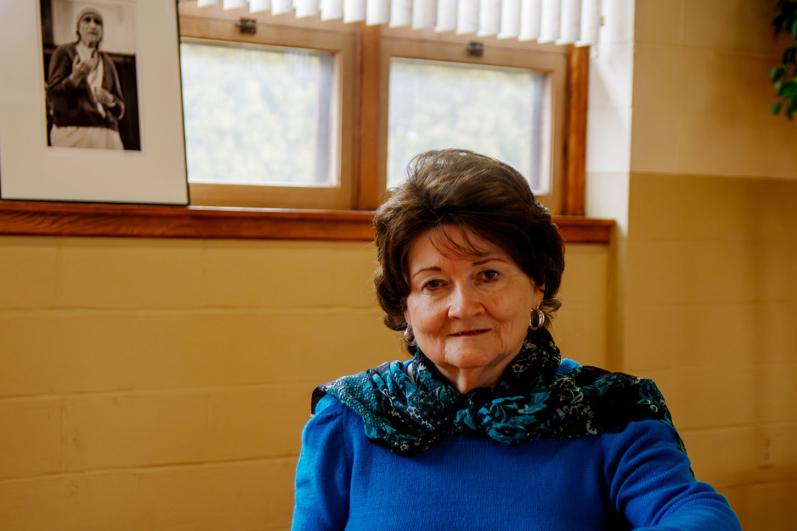'I believe in a second chance for people' says prison chaplain Sister Maureen Clark
FRAMINGHAM -- Nancy Wagner didn't know God until she was behind bars at MCI Framingham.
In 1988, at age 21, Wagner was convicted and sentenced to life in prison for the murder of her two-year-old daughter Sarah, who suffocated in her car seat. Wagner claimed to have no memory of the night her daughter died. Once imprisoned, not knowing whether she was responsible for Sarah's death, Wagner didn't care whether she lived or died. She began attending Mass every Sunday, and eventually met the Catholic chaplain, Sister Maureen Clark of the Sisters of St. Joseph of Baden. Wagner and Sister Maureen met every Monday for over 30 years, discussing Wagner's case, her childhood, prison life, and spirituality.
"I'm going to ask you a question," Wagner used to say to Sister Maureen, "and you have to answer. Do you think I'll ever get out?"
"Yes," Sister Maureen replied. "Now, I need to ask you a question, and you have to answer. You're out. And there's a big party to celebrate. What do you want to eat?"
Wagner wanted pizza. For dessert, "anything with chocolate."
Wagner didn't think she would ever get to attend that party, but Sister Maureen encouraged her to protest her innocence. Sister Maureen would bring volunteers into MCI Framingham, including the Innocence Project, a nonprofit that assists the wrongfully convicted. With their help, Wagner had her sentence commuted. She was released from prison in June 2020, and Sister Maureen threw a party with pizza, cake, presents, and almost 80 guests.
"She became someone I could trust, someone I could totally be honest with," Wagner told The Pilot in a Jan. 23 phone interview. "I didn't have faith or believe in anybody, and she showed me that there are good people who care. I mean, if it wasn't for her, I wouldn't be here right now."
Her murder conviction was overturned in 2023, and Sarah's death was determined to be an accident.
Speaking to The Pilot at St. George Parish in Framingham on Jan. 25, Sister Maureen said that she had always believed Wagner was innocent and hoped and prayed for her release. Wagner is just one of many incarcerated people that Sister Maureen has counseled in over half a century of prison ministry. In each prisoner's face, she sees the face of Christ. She often hears that chaplains "bring Jesus" to prisons, but she disagrees. Jesus, she said, is already there.
"I'm lucky," she said. "I'm lucky to be where I am and do what I get to do. That's where I meet Jesus."
Sister Maureen is in charge of the Sisters of St. Joseph Prison Ministry at MCI Framingham, which she established. She is also in charge of the Sisters of St. Joseph Prison Aftercare Program, founded in 1995 to help incarcerated women re-enter society after their release. Every month, she meets with "Aftercare Visitors" (volunteers) for dinner and training. In 1990, Sister Maureen created the Read to Me Mommy program, which has spread nationally. Incarcerated women in the program record themselves reading books to their children or grandchildren. The books and the recordings are then sent to the children. Sister Maureen provides alcohol and substance abuse treatment to inmates, and social-emotional therapy through the Houses of Healing program. She provides them exposure to art, music, and creative writing, and leads them in global service projects. In 2023, women incarcerated at MCI Framingham made t-shirts for children in Ukraine, Haiti, Florida, and Hawaii.
"Who hasn't made a mistake?" Sister Maureen asked. "Who hasn't had a hard time in life? The majority of people I met in prison have had horrific backgrounds. They've been victims of abuse from early childhood. And a lot of them suffer from a dual diagnosis of drug and alcohol addiction as well as mental illness. So you put that all together, it's a whole population of people who desperately need help."
Sister Maureen was born and raised outside of Pittsburgh, Pennsylvania, the daughter of a steelworker. Her father was her first and greatest inspiration.
"He was everything that you'd want to be as a Catholic and a Christian," she said. "If there was an opportunity to be kind to somebody, he saw it first. If there was an opportunity to serve other people, to help other people, he was there."
That was the life she wanted for herself. In 1966, she became a Sister of St. Joseph of Baden. She first stepped foot in prison in Pittsburgh in 1974. She was amazed by what she saw.
"They were not like the media portrayed," she said. "They were mainly people who couldn't afford a lawyer. And I was deeply touched by the people I saw there."
She taught dance, art, and improv to male prisoners.
"They were so respectful," she said. "I think it was because I was a woman in the midst of all those men that the majority of them saw it as their duty to be respectful and kind and protective of a woman in that setting."
She came to Massachusetts in 1987, serving at MCI Norfolk before coming to Framingham in 1989. She sees few differences between male and female prisoners.
"I met people who wanted help on all levels," she said.
When she and Wagner first met, Sister Maureen told her to tell her life story up to that point. Nancy Wagner was born Nancy McGeoghean in Cambridge, one of six children of abusive alcoholic parents. She ran away when she was 14 and never came back. She later became an alcoholic herself -- on the night her daughter died, she was in a drunken stupor. Sister Maureen was shocked by how normal Wagner made her childhood sound.
"I was thinking, 'Oh my God, I could not have lived through that,'" Sister Maureen said.
Both of Wagner's parents died when she was in prison, and when they did, Sister Maureen comforted her.
"It was a lot for me to open up," Wagner said. "But she had a way. She was nonjudgmental. I could just tell that she really cared about me and the women of Framingham."
When Wagner wanted to give up, Sister Maureen pushed her to get her GED, earn a college degree, receive spiritual counseling, and enter a substance abuse treatment program. This would require her to leave her unit in the prison, separating her from one of the beloved service dogs she started training while imprisoned. Sister Maureen helped her get the confidence to write a proposal to the superintendent, asking if her dog could come with her. The superintendent allowed it.
All the while, Sister Maureen's volunteers would bring some joy to Wagner and the other prisoners. Every December, they would perform skits, sing songs, and make Christmas trees out of paper. They faithfully met and talked every Monday until Wagner was finally released.
"I believe in a second chance for people," Sister Maureen said. "I really do."
Since becoming a prison chaplain, Sister Maureen has "no place" for judgmental people. Women at MCI Framingham often attend Catholic and Protestant services, regardless of their faith. Once, an inmate remarked: "Those hypocrites come to church."
In response, Sister Maureen wrote a few words on a piece of paper: "What if God would choose to judge me as harshly as I judge others?"
The inmate, touched by those words, asked Sister Maureen for the piece of paper, and kept it in her shirt pocket. Next week, when they had their meeting, the inmate pulled the paper out of her pocket.
"This is burning a hole in my shirt," she said, "because I'm out there and I'll be in a group and people will start talking about others, and I'll just walk away."
"That was a powerful experience," Sister Maureen remembered.
Part of Sister Maureen's ministry is inviting guest speakers to inspire the prisoners, including Sister Helen Prejean and Mother Teresa. When Mother Teresa visited MCI-Cedar Junction, then known as MCI-Walpole, Sister Maureen was there.
"She was just a fine, fine woman," Sister Maureen said. "Very holy woman."
When Mother Teresa walked on stage in the prison auditorium, all the prisoners began stomping their feet. The prison staff was furious. Mother Teresa was not offended. Sister Maureen smiled. She remembered that, whenever the prisoners were at a concert and enjoying the music, they would stomp their feet.
"They weren't being rude," she said. "They just were trying to say welcome."
After her talk was over, the leather chair she sat on was cut into pieces and distributed among the inmates.
Sister Maureen also invited Immaculee Ilibagiza, a woman who survived the Rwandan genocide by hiding in a bathroom for 91 days with seven other women, to speak. Ilibagiza said to Sister Maureen: "It just dawned on me. I was locked in that bathroom for how long, to save my life and other people. These people are locked every day. I'm only praying that what I have to say will be helpful."
Those words have followed Sister Maureen throughout her years of ministry. She praised Gov. Maura Healey's initiatives to improve prisoners' quality of life, including making phone calls and emails free. Gov. Healey visited MCI-Framingham and met with some of the inmates in 2023.
"The newness that Maura Healey is bringing is wonderful," she said.
Currently, 225 women are incarcerated at MCI Framingham. That number used to be 1,000, but the majority of inmates were transferred to county jails right before the COVID-19 pandemic. The pandemic only put in-person visits on hold for a couple of weeks. After that, Sister Maureen was back meeting with inmates.
"The women were locked down," she said. "All the units were locked down. What was difficult was the communication. They didn't know if their friends in the other units were okay or sick."
It was at the height of the pandemic that Wagner was released. After over 30 years in prison, Wagner had to learn how to use a cell phone, relearn how to drive a car, and reintegrate into a drastically changed world. She did it all with Sister Maureen's moral support. At Sister Maureen's request, a volunteer would check up on Wagner daily. She married Ray Wagner, her pen pal of 15 years while they were both imprisoned (she in Framingham, he in Colorado), and they moved to Florida. Sister Maureen attended their wedding.
"I consider her my best friend," Wagner said. "I couldn't imagine her not in my life."
Wagner is now a practicing Catholic. She feels no anger or resentment about her wrongful imprisonment.
"I hated how everything happened," she said, "but I'm grateful for the life I have now and the people I have in my life."
To Sister Maureen, Wagner's lack of bitterness could only have come from the grace of God. The two still connect regularly to talk about what's going on Wagner's life -- a life that is no longer confined within prison walls.
"It feels great," Wagner said. "It's the life that I never thought I would have."



















